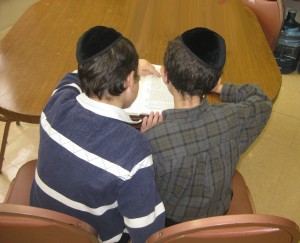 People usually see the world in One dimension – the physical dimension.
People usually see the world in One dimension – the physical dimension.
Duality of the World – the Spiritual Realm
Jewish People look at it in two dimensions – the spiritual realm and the physical realm.
We see clearly the spiritual dimension in Operation Protective Edge.
Though we do our best to protect ourselves from missile attacks in Israel by a military offensive – we also see the hand of G-d in deterring missiles from causing many casualties.
The Spiritual Dimension has an effect on the physical dimension. Because the Jews pray and follow the Torah, for the sake of Heaven – G-d protects us and our people.
It is really a cause and effect situation – positive spiritual efforts cause good, abundance and protection of the world. And spiritual degradation causes the opposite.
Thus, because of the spiritual efforts of the Jewish people, we are protected.
Jewish Amulets for Protection
Spiritual aids exist that help protect a person.
Kosher Mezuzas on the doors offer better protection of your home.
A Segula – is somewhat of an amulet or act that a person may do to affect a positive outcome.
For instance, King David had the Tehillim / Psalm 67 engraved in the Shape of a Menorah on his Shield. When he would contemplate the Tehillim in that shape he would receive divine protection.
Other Segulas for protection include – reading and believing in the 13 principles of Judaism from the Rambam.
Another One is to know clearly in one’s heart that “Ein Ode Milevado” – There is Only Hash-m / G-d. Meaning that only G-d controls all outcomes in the world.
Apparently these segulas are more effective when a person is also observing the Mitzvot properly.
Spiritual Growth
These offer excellent protection. Yet, the best protection, I feel is spiritual growth.
G-d wants us to be close to Him.
He sometimes sends difficulties for us to become closer. So if we respond to his messages, and make efforts to warm our relationship with Him, He will offer us greater protection. Obviously, desire for protection is not the main reason why someone should make a spiritual effort, but it is a fringe benefit.
The turmoil that occurs in the world causes us stress, it is nice to know that we have a safe haven – Hash-m to turn and look to. The Turmoil we see today may be the precursor to a war that the Jewish Prophets (Yechezkel / Ezekiel ch. 38-39) predicted, called the war of Gog Umagog.
Some of the things known about the War of Gog UMagog is that Gog is a leader, from a country in the North, that will battle against Israel. The Messiah will direct a military operation against Gog defending, Israel. The Messiah will be victorious. Some say the battle will last 3 hours. The Torah Genius, the Vilna Gaon said the war would last 12 minutes. It is possible if we are meritorious we will not have to be subject to this war.
Why People Sometimes Die Young
We cannot fathom the mysteries of G-d. Some Ask why bad things happen to good people?
Taking into account the spiritual dimension of life mentioned above, we can understand why people sometimes, G-d Forbid, die young. Sometimes it is because they came to this world to repair a transgression for what they did in a previous lifetime. They have a short stint, because when they make their reparation, they finished their spiritual objective in this life – and their soul is free to go back to Heaven.
A person comes to this world to earn reward to be able to live comfortably in the next world. If a good person starts descending spiritually too quickly and has no hope for improvement, G-d sometimes allows their life to be taken to prevent them from losing the reward for the next world that they already accumulated.
What to Believe in Today
G-d puts a person in a certain situation to see where they are holding. He puts them in a situation to see how they will react. Apparently, those that express their support or expose their biases in the conflict, are being prompted to do so by G-d. Then He will have a reason to either reward or punish them.
Thus it makes sense now for one to integrate the Torah’s outlook into their views. Not only will they see things, in a more objective manner, and will align their views with G-d’s perspective, but ultimately it will help them to be protected. Instead of relying on opinions of morality from “Human Right’s” activists, rely on morality from the one that created Humanity – G-d & His Guidebook – the Torah.
For a Jew to survive – it would be helpful to become familiar with the 13 principles of the Rambam and accept them. For a Gentile to Survive they should learn more about the 7 Noahide laws.
How to Live Long – Doing acts of loving-kindness
On the other side of the coin, by looking at the spiritual dimension, we learn how a person can improve his or her chances to live long.
Just doing kindness in itself helps a person merit to live long.
But there is another reason why a person merits to live long doing kindness. Doing acts of loving kindness – other people in the world will need this person’s kind deeds. G-d does not want to upset people. If a person would die, some people who love this person would feel badly or suffer by losing this kindness he or she was offering. Thus G-d spares their life.
There were two rabbis from the house of Eli. Members of the family of Eli had a propensity to live a short life. One Used to go out of their way to do acts of kindness. The other did not. The one that did kindness lived till 60 – the one that didn’t lived to 40.
Three Simple things one can do to improve their chances of protection.
1. Spiritual Growth – Doing a Mitzvah protects a person while they are involved in it. Slowly but steadily increasing Mitzvah observance will help a person to be protected. Teshuva – Regretting, and rejecting transgressions of the past and taking a new Mitzvah Upon oneself, little by little, when one is ready is the way to go. This prevents stagnation and makes life a beautiful growing process.
2. Torah Learning – Torah learning in itself protects a person even after they stop learning. Asides from being pleasurable, engaging and satisfying it helps a person to gain consolation from the difficulties. Setting a fixed time daily can be done by anyone. A plethora of Jewish Torah books exist in most English and other languages. Dedicating even Five Minutes daily – reading an Artscroll Chumash or learning with a learned Rabbi – over the phone – does wonders. A Gentile can learn about the 7 Noahide Laws.
3. Doing Acts of Kindness – helps a person to live long. Kindness includes providing hospitality for guests, visiting the ill, burying the dead, making peace between people, not speaking badly about others. Prayer for others well-being, and including yourself is also a kindness. Doing Kindness stems from the Mitzvah of “Loving Your Fellow.”
Some of the Specific things the Torah mentions to be saved from the war of Gog uMagog is – Partaking in the three meals of Shabbat, especially Seuda Shelishit (the 3rd meal). “Being occupied with Torah and Hesed / Kindnesss” is also mentioned by the Torah as a way to be saved from the war.
Someone once mentioned to me that “being occupied with Torah” means – Learning Torah.
And doing “Kindness” – means Teaching Torah.









